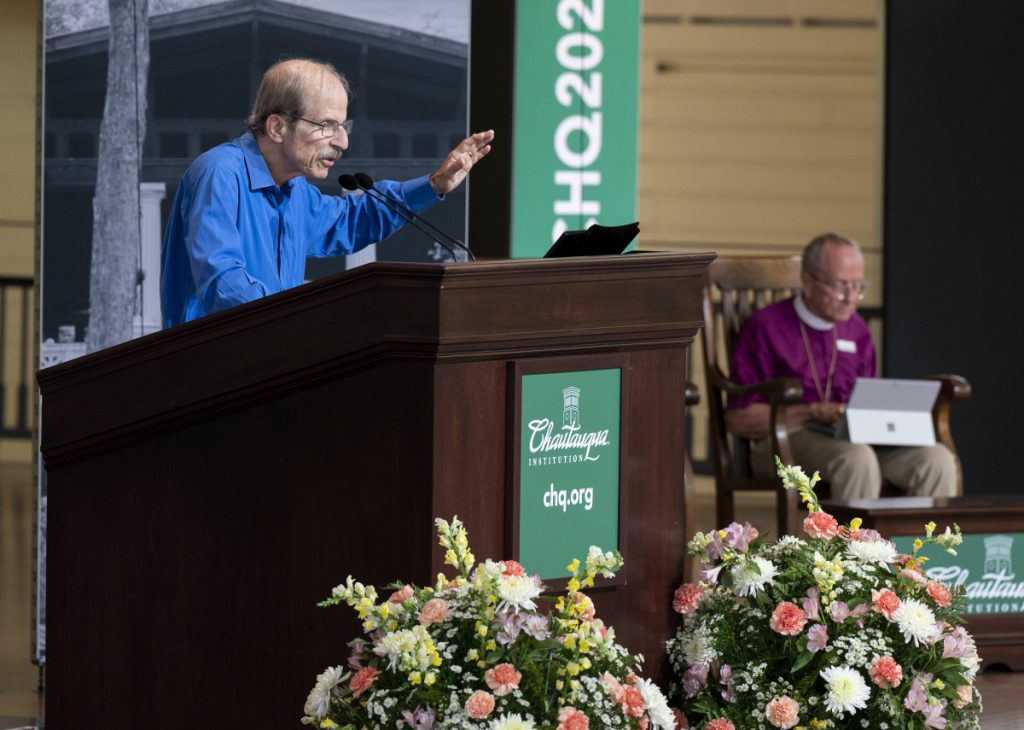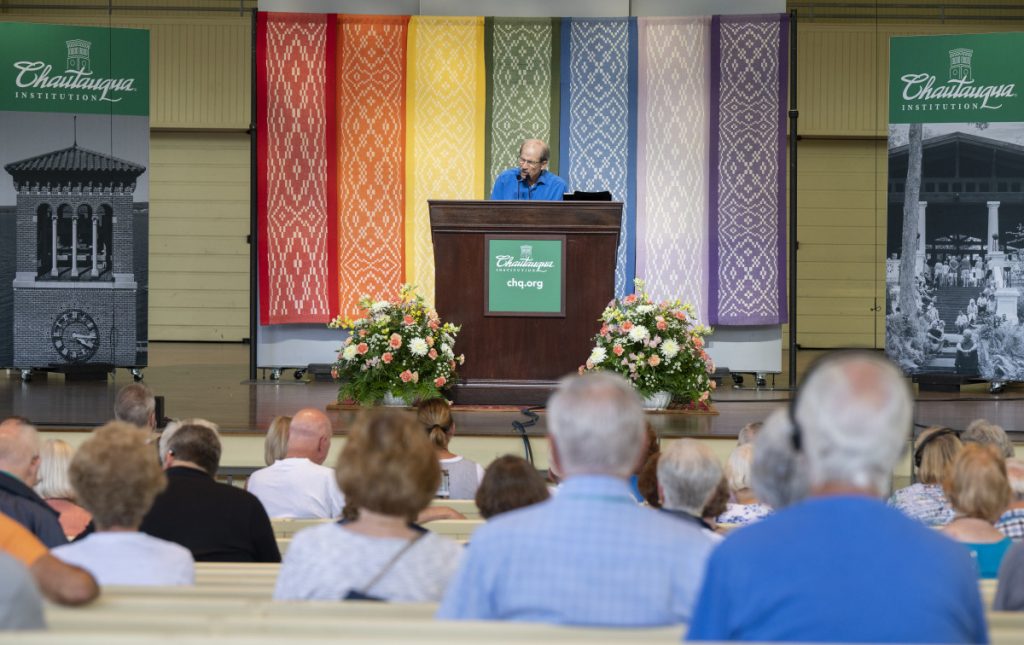MAX ZAMBRANO – STAFF WRITER

Michael Krasny has what he called a treasure trove of Jewish jokes, plenty of which stem from the common notion that Jewish humor comes from a place of suffering. He even opened his lecture, “Jewish Humor: History, Culture and Identity,” with one such quip.
“The idea that Jewish humor is masochistic? I’m so tired of hearing that, that I want to kill myself,” Krasny said, drawing his first of many laughs from the Amphitheater.
Krasny’s 1 p.m. lecture on Monday, July 26 was the first of three Interfaith Series Lectures for Week Five, themed “The Authentic Comedic Voice: Truth Born of Struggle.” He is the author of Let There Be Laughter: A Treasury of Great Jewish Humor and What It All Means.
Additionally, Krasny taught literature and the English language at several colleges, including San Francisco State University, Stanford University, the University of San Francisco and the University of California. For three decades, he was a radio host, most notably for KQED’s “Forum,” which he hosted from 1993 to his retirement this past February.
For his lecture, Krasny told plenty of Jewish jokes with the goal of getting his audience to understand their context and underlying meaning.
One joke he hadn’t heard until he wrote his book, published in 2016, starts with a rabbi who sees a young, sad-looking man at his congregation. He approached the man to see what was wrong, to which the man replied that he was looking for a wife. He had found several online that he liked, but his mother didn’t approve of any of them.
The rabbi asks the man if he looked for someone with similar traits to his mother. Not having done so yet, the man takes the rabbi’s advice, only to return a few weeks later looking worse for wear. The rabbi asks what happened.
“The man said, ‘I found someone online who is not only interested in the same things as my mother, but cooks the same things, too. She looks and sounds like my mother. I brought her home, and even my father couldn’t stand her,’ ” Krasny said.
This joke, Krasny said, pokes at the heart of long-lasting marriage and the institution of marriage in Jewish values.
Next, Krasny said a new perspective can form by looking at Ashkenazi and Yiddish origins.
“There’s the joke about two Jews, that’s tragically not all that unusual, who are in front of a firing squad,” he said. “They’re standing there before the squad, which is about to ready, aim, fire, and one of the Jews said to the other, ‘Don’t we get a last wish to ask for a cigarette?’ The other said, ‘Be quiet, do you want to get us in trouble?’ ”
Krasny said this joke points at Jews’ fear of bringing wrath upon themselves.
Following this joke, Krasny told one which he said metaphors Jewish assimilation in America. It started with a New York Jew, Frenchman and German traveling in the Amazon when they are captured by cannibals.
Taken to the village, the leader comes out in a loincloth to tell the men they are to be killed and eaten by the village, but because they are humane, they allow the three to choose how they die, and their skin will be turned into canoes.
The Frenchman chose a guillotine, and his head was chopped with a hatchet. The German chose a Luger, so the leader shot him with a gun. The New York Jew asked for a fork. The leader, confused, pulled one out, and the Jew took the fork.
“He takes the fork and starts stabbing himself with it and says, ‘Here’s your effing canoe,’ ” Krasny said.
Krasny teased that he wasn’t sure if he should tell that joke because we live in a “woke time” and the term “cannibal” could offend cannibals. Comedians like Chris Rock and Jerry Seinfeld have said publicly they don’t like to perform on college campuses anymore because their humor isn’t politically correct.
“It says a lot about humor that one has to be painfully conscious,” Krasny said. “When you go into Jewish humor, you find plenty of stereotypes about Jews themselves and about every group you can imagine. You can find a lot of misogyny.”
He gave three such jokes, one of which was about a Jewish man who wanted his body cremated, which goes against Jewish orthodoxy, Krasny said.
“He wants to be cremated and his ashes put in Bloomingdale’s — so he’s certain his wife will visit him occasionally,” Krasny said.
Krasny said that although the misogynistic jokes were off-putting, they reference how after Jewish people immigrated to the United States, they wanted to spoil their daughters.
“When you analyze Jewish humor, you realize a lot of it is about assimilation,” he said, “the idea (Jews) came here from real suffering and found humor and joy in a land that really granted them freedom they had never had.”
Understanding assimilating in the U.S. means looking at three groups: the pious Jew, the conservative Jew and the reform Jew, Krasny said.
One joke Krasny told illustrated the difference between each group through the word “Berakah,” which translates to “blessing.” In the joke, a young Jewish man goes to an orthodox synagogue to ask for a Berakah on his new Mercedes. The rabbi is horrified and tells him to go to a conservative rabbi down the street.
The conservative rabbi doesn’t help him either, but points to a reform rabbi further down. The reform rabbi asks the man more about his Mercedes, such as what model, telling him that he has one, too. He then asks the man a question.
“By the way, what’s a Berakah?” the punchline went.
When you analyze Jewish humor, you realize a lot of it is about assimilation — the idea (Jews) came here from real suffering and found humor and joy in a land that really granted them freedom they had never had.
—Michael Krasny
Former host,
KQED’s “Forum”
Plenty of Jewish humor is self-deprecating, and Krasny said it is apparent that these jokes indicate some pain or loss. But, he said a lot of the humor can be celebrative, too.
In one example, Krasny said an old Jewish man was sitting between two Texans on a flight to Dallas. One of the Texans said, “My name is Roger, I own 250,000 acres, 1,000 head of cattle and they call my place ‘Jolly Roger.’ ”
The other Texan said, “I’m John, I own 350,000 acres, I have 5,000 head of cattle and they call my place ‘Big John’s.’ ”
They asked the smaller Jewish man his name and what he owned. His name was Lenny Liebowitz, and he owned 300 acres and didn’t raise any animals. The perplexed Texans asked him what he called the place he owned.
“Downtown Dallas,” he said.
Krasny said it’s common for Jewish humor to lean into the ideas that all Jews are capitalist or that all Jews are communist, which reflects real life antisemitic thoughts.
“It’s taking stereotype and antisemitism and turning that into a joke,” Krasny said.
Another trope of Jewish humor picks at the idea some think they are chosen to have the Torah, the Jewish holy text that also comprises the first five books of the Bible. Krasny said when he was a boy he was told he wasn’t even the first choice, wasn’t superior and the idea of chosenness is misappropriated.
“Much of this humor is about loss, differentness, separateness,” he said. “It’s really about identity.”
Some of the old Yiddish in jokes brings back memories, Krasny said. One joke involved the word “mishigas,” meaning craziness.
The joke centers on two Japanese men, and one tells the other that his wife is having an affair with a Jewish man. He decides to confront her.
“She says, ‘Who told you this mishigas?’ ” Krasny said.
Yiddish has its own cadence, Krasny said, making it humorous in context.
“When we go back to these jokes, we realize they have much more meaning than we thought they did,” he said. “A lot of the jokes that became current in American Jewish culture were barrier-breaking, envelope-pushing jokes.”
He referenced one Woody Allen joke, but first noted that some people may not even want to hear Allen’s name anymore after the HBO documentary series “Allen v. Farrow,” detailing the allegations of abuse leveled by Allen’s ex-wife and adopted daughter.
The joke, poking at Jewish cheapness, goes, “I thought I read about metaphors with the Bible and the burning bush with the Red Sea parting, but then my Uncle Sasha picked up the check.”
Krasny said some people argue these jokes shouldn’t be told in mixed company, but he said it’s important to understand the larger context of these jokes.

Some jokes are cross-cultural, in that the setup and punchline are the same but can be given a Jewish twist. Krasny gave an example of one that did not cross cultures.
“This Jewish guy is getting knighted by Queen Elizabeth, and he has a yarmulke on his head, and there’s a line of men and she says ‘What makes this knight different from all the other knights?’ I don’t think that spreads out to different cultures,” he said.
He then gave examples of cross-cultural jokes. One of them involved a barber who wouldn’t take money from a person of God. He denies payment from a priest, who leaves him a crucifix and a note of thanks at the barbershop the next day. The same happens with a minister, who leaves a Bible with an inscription of gratitude the following day.
When the rabbi gets a haircut, and is told he doesn’t have to pay, the next day there are 12 rabbis at the barbershop.
At a dinner with friends, Krasny said he heard the same joke, but it was a Frenchman, Englishman and Chinese man, and 12 Chinese showed up the next day.
In searching for the quintessential Jewish joke, Krasny found one from Harvard professor Ruth Wise about a German, Frenchman, Mexican and Jew who have made an arduous trek up a mountain. At the top, each are tired and thirsty.
The Mexican said he must drink tequila. The Frenchman said he must drink wine. The German said he must drink beer. The Jew said he must have diabetes.
“We complain a lot. We see problems when they shouldn’t be there, but nevertheless that’s who we are, and in some ways we own it,” Krasny said.
Krasny said laughter was necessary for a healthy life.
“We need laughter,” he said. “Laughter sustains us.”




